How I manage my time as a medical student and YouTuber – Nine Tips to Manage Time Better13 min read
My free time per week dwindles the older I get. That’s why it’s important, vital, that I maximize my use of what little free time I have. I have started a YouTube channel and a website during medical school without sacrificing grades, fitness, or sleep with these nine strategies.
Here are nine ways to manage time better.
Prioritize
Time, just like money, is something created by us. It really has no bearing past the credit we give it as a society. Just like money, time can be spent well or poorly.
Time is a created thing. To say, “I don’t have time” is to say “I don’t want to.”
Lao Tzu
Before we can even begin to spend our time wisely, we need to figure out what we want to do; we need to figure out our priorities.
1. Shift your mindset
Decide, and realize that you do have time for certain things. You choose not to do those things. You choose not to make time. I, for example, always want to read more. I don’t feel like I read enough. But, I feel like I “need” to watch 30 minutes of TV before bed to “relax.” In reality, I do not need to do that. That time could be better spent reading.
Time is in your control. Understand that, believe that, and a whole new world opens up.
2. Decide priorities
What are things you are unwilling to compromise? What are things you must do? For some, that may be going to work; for others, that may be going to school; for me, for example, that’s going to clinical rotations.
I like to break it down into things I absolutely have to do, things I absolutely want to do, and things I want to do.
Here are some things I HAVE to do:
- Clinical Rotations
- Sleep
- Eat
Here are things I absolutely want to do:
- Cook nice and healthy food
- Exercise
- Study for medical school
- Meditate
Here are things I want to do
- Work on my YouTube channel and Website
- Hang out with my family and friends
- Read Books
Now, this is nice, right? I have broken down, really my entire life, into categories. Now what I can do is start to prioritize within these categories and make time for the things I want to make time for.
3. Be ruthless with your time
Priorities are done, but to figure out how to best spend our time, we need to figure out how we are already spending our time.
a. Analyze
Go through the last day and keep track of everything you did. How are you spending your time? For example, some things I did yesterday were:
- Slept for eight hours (eight hours)
- Studied for my pediatrics rotation (four hours)
- Ran six miles (one hour)
- Wrote website articles (two hours)
- Meditated (20 minutes)
- Cooked a meal of curry (90 minutes)
- Browed YouTube, YouTube studio, Instagram, Twitter, Google, and Reddit on my phone (90 minutes)
- I watched three episodes of TV (New Girl, West Wing, Adventure Time) (two hours)
- Played video games (Apex Legends) (30 minutes)
- Cleaned my apartment (15 minutes)
- I had coffee with a friend (two hours)
I would try and do this for one week, just for one week, at the end of every day. Add to this list of things you did. You do not need to track each day separately. Just keep adding to this running list of things you did. Be brutally honest here, don’t skip anything.
b. What’s essential
Then, just go through the list and label things as “Essential,” (I use a ✅).
c. What’s not essential
Then, label things that aren’t essential as “Non-Essential,” (I use an ❌).
Plan
Just plan the essential things. Is starting your YouTube channel essential? Writing your book essential? Going to the gym essential? If you haven’t made that distinction in your mind, it will be challenging to get it done. Whatever you are trying to accomplish needs to become a part of your life, a part of who you are. Making my YouTube videos is essential because I have a deadline to post a new video every week at 12 pm EST. I am a YouTuber, making YouTube videos is essential.
Let’s get into each week and each day about how I plan my essential things.
And, yes, I do time block most of my days, but it makes decision-making and life much easier. Sometimes I don’t do what is scheduled, but I have a frame for what I need to accomplish that week.
4. Schedule time for the “Daily Goal” (From of Ali Abdaal)
This is something I’ve recently adopted and loved. What you do, is every day, schedule time for the one thing you want to get accomplished. Now, the only thing I wish Ali talked about more is the specifics. So, the specifics that have worked for me is setting a spot in my calendar between one to four hours of this “daily goal.”
This daily goal usually entails something with my YouTube channel, whether it’s writing the scripts, recording A roll, editing. However, sometimes it is a break.
5. Daily and weekly specific planning
a. General
Some things have been scheduled for a while, right? For example, “work,” from 9-5, you need to schedule that in. Lectures, you need to schedule that. A birthday dinner, you need to schedule that.
Meals, as well, I like to plan the week before. I usually cook four meals on the weekends. That’s 8x leftovers because I make three portions every time I cook. Then I have lunch leftovers 4x during the week and dinner leftovers 4x during the week. One lunch I eat out, and one dinner I eat out. At this phase, I am just planning what meals I would like to get and groceries to get for the week; I am not actually inserting them into my calendar.
Exercise I plan out. With clinical rotations finding time has been difficult. Still, if I am home, I make sure to try and lift as a priority, then run as a second priority, then do yoga as a third priority, but preferably all three and some soccer! Usually, this means I am doing two days on the weekends on a particularly busy clinical rotation. Again, I am not inserting it into my calendar yet, and I am just figuring out what kind of exercises and workouts I want to do.
So, as you can see below, I have in my calendar for the upcoming week pre-planned events and rotations I have to go to.
Bonus*: What I also like to do, is schedule two hours a week to a. reflect on the past week and b. schedule the next week as I am doing right now. In this time, I will plan out my meals, what projects I will focus on, and what activities I need to do. Basically, I will go through this entire post I have made here again on my own.
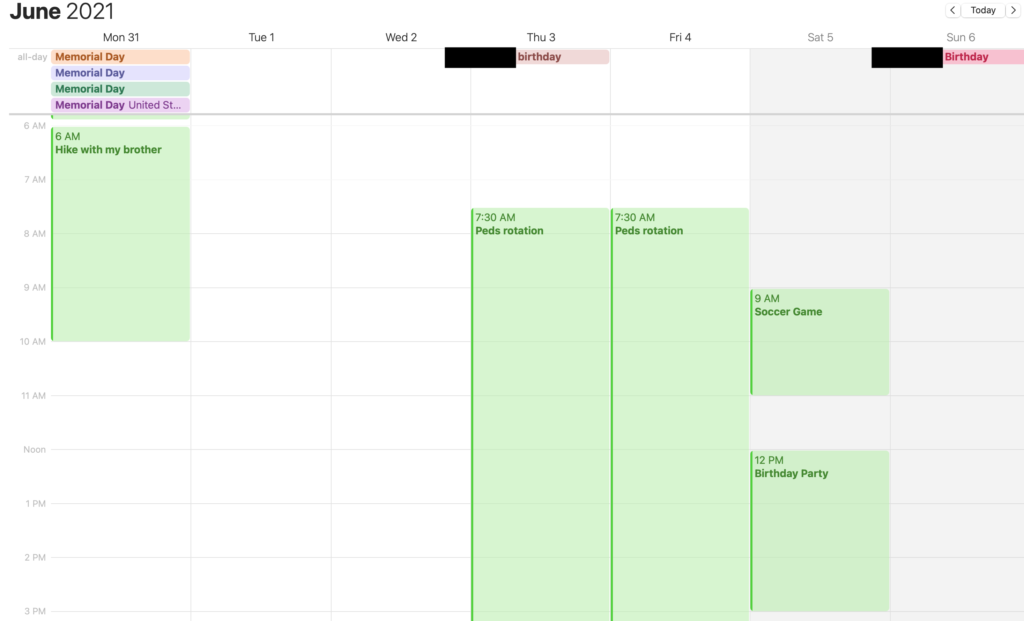
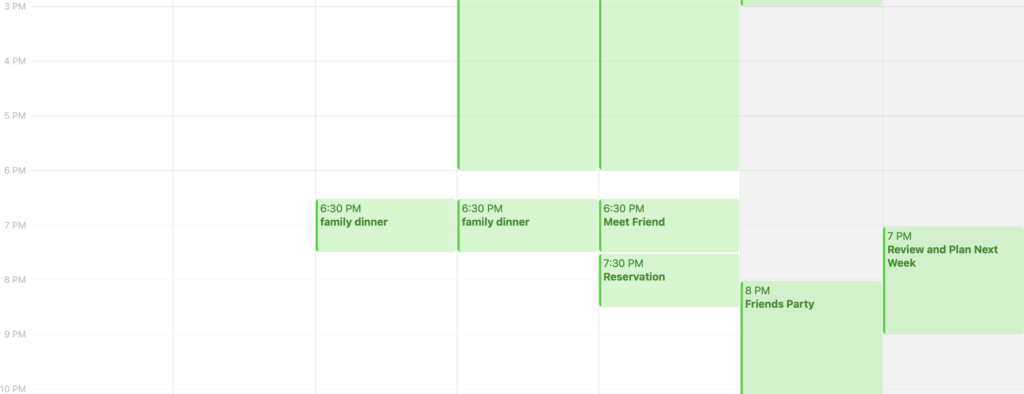
b. Weekly plan
This is where the bulk of the work comes in because this is where the essential selections come in. Really, those blanks are the free time I have, time that I get to choose what to do, all on my own. Luckily, this week because we are switching to a new rotation, I have lots of free time. But, usually, most people will have these time blocks of “freedom” on the weekends. This is valuable time. What are you going to do with it?
So, if we go back to the beginning, where did I decide things that are really important to me? I said:
- Cook nice and healthy food
- Exercise
- Study for medical school
- Meditate
So now I will insert those things into my calendar when it makes sense for me to do these things. Starting with categories. Some small things:
- I like to cook right after I exercise
- I like to study and meditate in the mornings
See now things are filling up a little bit:
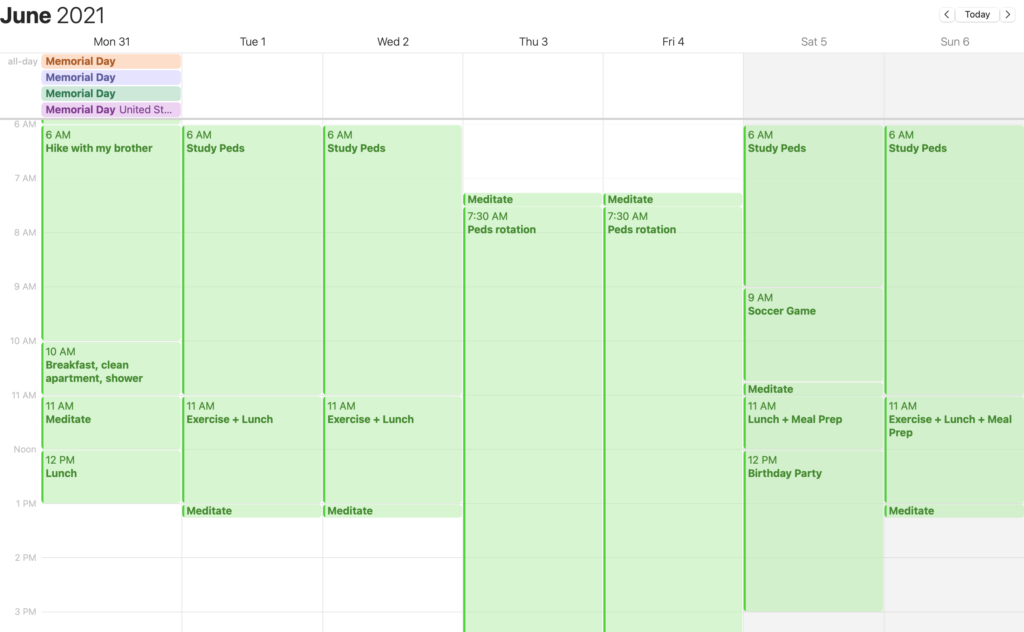
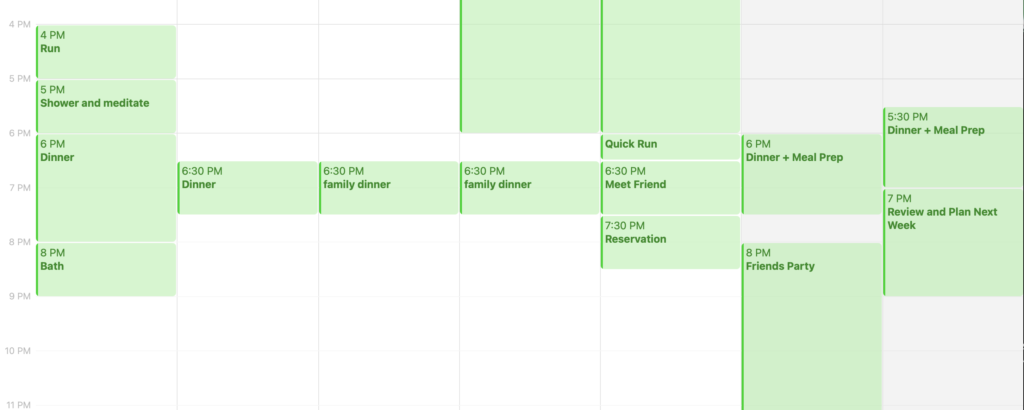
Notice the calendar is mostly filled up, but that’s ok. These are the things I want to do the most. The essential things. They should take up most of my calendar.
Finally, let’s throw in the “daily goal” and the “junk hour.” Throughout the week, I accumulate little tasks that I need to do. This might be filling out a form online, changing small things on my website, or transferring things from my to-do list (like YouTube video ideas) to Notion. These small items usually take between five and twenty minutes, and I knock them all out in my junk hour. I allocate two hours for it, but it usually only takes one hour.
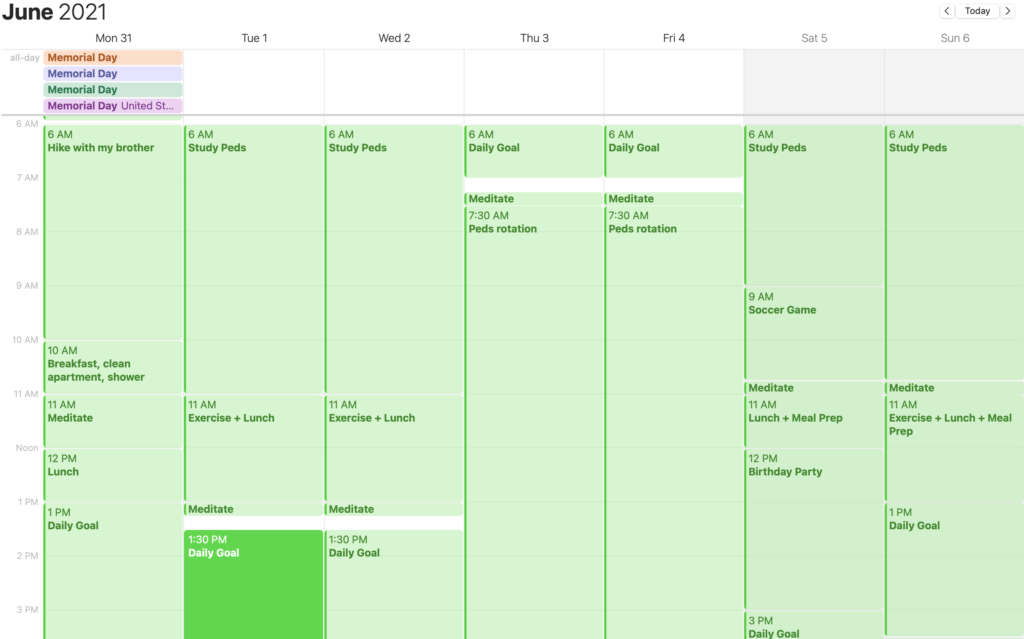
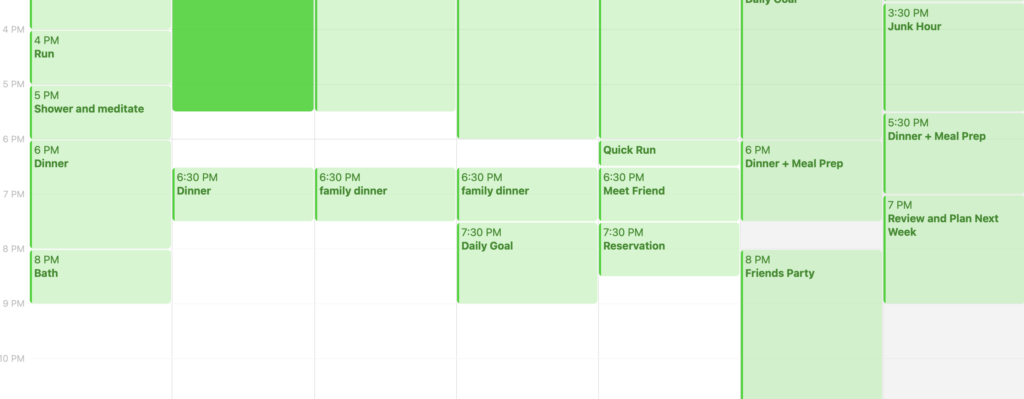
Then that’s it! My day is filled up.
c. Daily plan
This is where we get into the nitty-gritty. I know my weekly plan says things like “Daily goal” or “Study Pediatrics,” but what does that mean? Here is where I fill that in.
Very simply, I go to my calendar, see what I have timeboxed from my weekly plan, and write that on a sticky note. If there are more specific things to do, I write that on a sticky note.
So, if tomorrow says “Exercise,” and “Study Peds,” and “Daily Goal,” I plan specifically how I am going to study, what exercise I am going to do, and what my daily goal will be.
- Anki Reviews and 50 new cards
- 3 Pediatric Videos
- 3 Case Problems
- Speed Run (Exercise)
- Write out two YouTube videos (Daily Goal)
6. Use To Do Lists
My mind can’t hold much. When I think of something, if I don’t write it down, I’ll forget it. This could be a YouTube video idea, groceries I forgot to buy, or my 76th amazon purchase of the week.
This To-do list is then completed or transferred to notion at the end of the week in my “junk hour.”
Perform
Now, this really is the hardest part. Planning is kind of fun on Sundays; I listen to music, maybe if I’m going crazy, I’ll have sparkling water, and I’ll plan my week. Whether studying or writing, doing the work is the hardest part but the most important part.
Let’s figure out how to make sure we do the most important part.
7. Live in Task-Tight Compartments
Sir William Osler said, “live in day-tight compartments,” and this is amazing advice. However, I often think about the next thing I need to do during the task I am doing. For example, I do flashcards in the morning and think about the YouTube video I need to edit later. That harms my performance and time efficiency of the flashcards and harms my mentality for working later.
The Pomodoro method is essential here.
Batching is another good thing to do here as you can live task-tight and task-efficient. What makes more sense, washing your towels one day, your socks another day, and your britches another day, or washing them all in one day?
8. Plan Breaks
Every 25 minutes of studying, I take a five-minute break. Every two hours of studying, I take a 30-minute break. Every week of studying I take a half-full day off. Every month I take a full day off everything (including anything YouTube, website, or work).
The daily goal, however, can come into use here. If I feel overwhelmed or overworked, I may use that time to go outside, watch tv, or (frequently) play video games.
If I didn’t care about my mental health and only PRODUCTIVITY, I would still take breaks. Why? When I take breaks, I perform better. When I used to block out my study time, for, say, four hours, I often would only actually study for three hours (if I’m generous). Using the Pomodoro method, with scheduled breaks and a four-hour session, I will study for three hours and twenty minutes.
9. Delegate
Finally, your time is valuable. Delegate as much as you can. You can do everything better than anyone? Why don’t you build your own house then or sew your own clothing? You don’t do those things because that would be silly. It makes monetary and time sense to have other people do those things; they have the training and experience to do a better job than you in less time. Why then is there this imaginary cutoff for cleaning your place? Arranging meals*? Painting a room in your house?
If you delegate, you free up time to spend on things that you can do more efficiently and better than other people. Doesn’t that make the whole world more efficient?
*I love cooking for myself, but I know there are many other people that can do it better and quicker than me. I just enjoy the process which is why I still do it. If I didn’t enjoy cooking, and it made fiscal sense, I would buy pre-made meals or have someone cook for me.
Summary
Ok let’s summarize this jumble of information, it comes down to a few things:
- Prioritize your life: what is essential? What is non-essential? You are in control of your time, you are in control of what you want to be doing.
- Plan: what, where, and how will you be doing your essential things? Put it in the calendar.
- Perform: you know what to do and why you need to do it, now just do it.
Conclusion
One of the hardest parts of all of this is discipline. I don’t plan to watch that TV or play video games I just do. It’s a constant journey to get better and improve how I spend my time. What I’ve found, is that with this plan, with these nine strategies, I am spending less time goofing off and more time doing what’s meaningful to me.
-Zach
6 Comments
Arko Saha · June 12, 2021 at 1:52 pm
Hey Zach, I am a big fan of yours and have been reading your articles since a long time. I have implemented every idea and suggestion of yours in my life which have resulted in good grades and hitting the gym in the past year but I cannot keep up with this habits for more than a month ,maybe due to the lack of self discipline. ****So can you give me some tips on how to maintain super consistency in my work and also how to be brutally disciplined ????****
Zach · December 20, 2022 at 1:42 pm
Sorry it’s taken me so long to reply to you here. Amazing work and congratulations on the grades! I have a couple posts if you just search “focus” on the website, but, mainly:
– Have a reason why you want to do your habit? Will it make you healthier? Will it get you into your dream goal?
– physically remove all distractions and use the pomodor method when working
– use a physical tracker, I like buying a calendar and doing a green checkmark on the days when I did both hitting the gym and studying.
Hope that helps! I go more in-depth on a couple posts on my website you can check out.
Quinn · June 12, 2021 at 2:10 pm
Any recommendations for time planning/tracking apps?
Zach · December 20, 2022 at 1:42 pm
I just use the calendar app on my Mac. Google free calendar is all you need. I also use Things for to-dos.
Supriya · June 14, 2021 at 7:59 pm
I love calendar blocking as well but I was wondering what your schedule was like in M1/2 in regards to extracurriculars. How were you able to working 8hrs study time?
Zach · December 20, 2022 at 1:43 pm
I didn’t do much extracurriculars except exercising, yoga, running, YouTube, and hanging out with friends. I had my lectures recorded so would watch them at 2x to save speed or not watch if it was a bad lecturer.